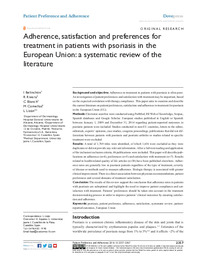Please use this identifier to cite or link to this item:
https://hdl.handle.net/11000/34982Full metadata record
| DC Field | Value | Language |
|---|---|---|
| dc.contributor.author | Belinchón, Isabel | - |
| dc.contributor.author | Rivera, R. | - |
| dc.contributor.author | Blanch, C. | - |
| dc.contributor.author | Comellas, M. | - |
| dc.contributor.author | Lizán, L. | - |
| dc.contributor.other | Departamentos de la UMH::Medicina Clínica | es_ES |
| dc.date.accessioned | 2025-01-18T13:01:42Z | - |
| dc.date.available | 2025-01-18T13:01:42Z | - |
| dc.date.created | 2016-11-17 | - |
| dc.identifier.citation | Patient Preference and Adherence. 2016 Nov 17:10:2357-2367 | es_ES |
| dc.identifier.issn | 1177-889X | - |
| dc.identifier.uri | https://hdl.handle.net/11000/34982 | - |
| dc.description.abstract | Background and objective: Adherence to treatment in patients with psoriasis is often poor. An investigation of patient preferences and satisfaction with treatment may be important, based on the expected correlation with therapy compliance. This paper aims to examine and describe the current literature on patient preferences, satisfaction and adherence to treatment for psoriasis in the European Union (EU). Methods: Electronic searches were conducted using PubMed, ISI Web of Knowledge, Scopus, Spanish databases and Google Scholar. European studies published in English or Spanish between January 1, 2009 and December 31, 2014 regarding patient-reported outcomes in psoriatic patients were included. Studies conducted in non-EU countries, letters to the editor, editorials, experts' opinions, case studies, congress proceedings, publications that did not differentiate between patients with psoriasis and psoriatic arthritis or studies related to specific treatment were excluded. Results: A total of 1,769 titles were identified, of which 1,636 were excluded as they were duplicates or did not provide any relevant information. After a full-text reading and application of the inclusion/exclusion criteria, 46 publications were included. This paper will describe publications on adherence (n=4), preferences (n=5) and satisfaction with treatment (n=7). Results related to health-related quality of life articles (n=30) have been published elsewhere. Adherence rates are generally low in psoriasis patients regardless of the type of treatment, severity of disease or methods used to measure adherence. Biologic therapy is associated with greater clinical improvement. There is a direct association between physician recommendations, patient preferences and several domains of treatment satisfaction. Conclusion: The results of this review support the conclusion that adherence rates in patients with psoriasis are suboptimal and highlight the need to improve patient compliance and satisfaction with treatment. Patients' preferences should be taken into account in the treatment decision-making process in order to improve patients' clinical outcomes by ensuring satisfaction and adherence. | es_ES |
| dc.format | application/pdf | es_ES |
| dc.format.extent | 11 | es_ES |
| dc.language.iso | eng | es_ES |
| dc.publisher | Taylor & Francis. Dove Press | es_ES |
| dc.rights | info:eu-repo/semantics/openAccess | es_ES |
| dc.rights | Attribution-NonCommercial-NoDerivatives 4.0 Internacional | * |
| dc.rights.uri | http://creativecommons.org/licenses/by-nc-nd/4.0/ | * |
| dc.subject | psoriasis | es_ES |
| dc.subject | patient preference | es_ES |
| dc.subject | adherence | es_ES |
| dc.subject | satisfaction | es_ES |
| dc.subject | systematic review | es_ES |
| dc.subject | patient-reported outcomes | es_ES |
| dc.subject | European Union | es_ES |
| dc.title | Adherence, satisfaction and preferences for treatment in patients with psoriasis in the European Union: a systematic review of the literature | es_ES |
| dc.type | info:eu-repo/semantics/article | es_ES |
| dc.relation.publisherversion | 10.2147/PPA.S117006 | es_ES |

View/Open:
Adherence, satisfaction and preferences for treatment in patients with psoriasis in the European Union. A systematic review of the literature.pdf
435,13 kB
Adobe PDF
Share:
.png)
